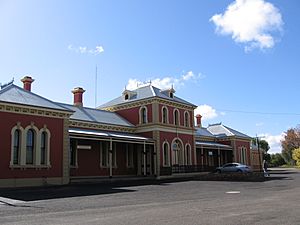Hay railway station facts for kids
Quick facts for kids Hay railway station |
|
|---|---|
 |
|
| Location | Hay railway line, Hay, Hay Shire, New South Wales, Australia |
| Owner | Transport Asset Holding Entity |
| Official name: Hay Railway Station and yard group | |
| Type | state heritage (complex / group) |
| Designated | 2 April 1999 |
| Reference no. | 1167 |
| Type | Railway Platform/ Station |
| Category | Transport - Rail |
| Lua error in Module:Location_map at line 420: attempt to index field 'wikibase' (a nil value). | |
Hay railway station is a very old and important train station in Hay, Australia. It's a special heritage site because of its history and unique design. The station was the end of the Hay railway line, which is now partly closed. It was added to the New South Wales State Heritage Register in 1999.
History of Hay Station
When the Station Operated
The Hay railway station first opened its doors on 4 July 1882. For many years, it was a busy hub for trains and people. The station officially closed on 18 November 1989. The very last passenger train to use the station was on 25 November 1983.
Restoring the Station
After closing, the station building was carefully restored. In 1992, it was painted back to its original heritage colours. Later, in 2003 and 2004, the roof was fixed, and the platform was repaved. These efforts helped keep the old station looking great.
What the Station is Used For Now
Today, the Hay railway station building is used by the local council, the Hay Shire Council. It is home to the community radio station, 2HAYFM. It also houses the POW & Internment Camp Interpretive Centre – Dunera Museum. This museum teaches visitors about the history of prisoners of war and internment camps. In the early 1990s, it was used as a training centre.
What Hay Station Looks Like
The Main Building
The main station building is made of brick. It's a "first class" design, which means it was built to a very high standard. This building and its brick platform were built in 1882.
Other Important Structures
Near the station, there's a goods shed. This shed is made of corrugated iron and has an awning. It's about 18 metres (60 feet) long and 5 metres (16 feet) wide. The station complex also has an old timber-framed water tank. This tank was made in 1881 by Albion Engine Works in Pyrmont. There's also a special crane called a jib crane.
The Stationmaster's House
The former home of the stationmaster is also a brick building. It has a pyramid-shaped roof and is located on Murray Street. This house was sold around 1994. Because it's no longer part of the station property, it's not included in the station's heritage listing anymore.
Why Hay Station is Important
A Special Place in History
Hay railway station is a very important site in the history of New South Wales railways. The station building shows how different states in Australia used to compete. This competition led to the building of a grand station in Hay. Hay was a key place for sending wool to Sydney. The railway line was built because the state of Victoria was offering special deals to ship grain through its ports. New South Wales wanted to keep its trade within its own state.
A Grand Design
There was also a plan, though not officially stated, to extend the railway line from Hay all the way to Adelaide. The large size and high quality of the station building show how important this future plan was. The buildings at Hay are very well-made and detailed. They are considered some of the most important railway structures in the state.
A Unique Station
Hay is the only "first class" station in New South Wales that was not built on a main railway line or at a major junction. This makes it even more special and important. All the buildings and structures at Hay are very significant. It's important that the entire site is kept together for future generations to learn from.
Officially Recognized Heritage
Hay railway station was officially listed on the New South Wales State Heritage Register on 2 April 1999. This means it meets certain important standards.
Rare and Unique Features
The station is considered rare in several ways. It's historically rare, meaning its story is unique. It's also scientifically rare, which means it offers special insights for research. It's architecturally rare because of its design. Finally, it's socially rare, showing its special place in the community's history.
 | Delilah Pierce |
 | Gordon Parks |
 | Augusta Savage |
 | Charles Ethan Porter |

